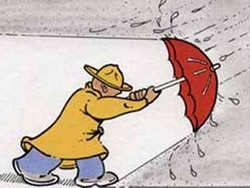Paul Lyons* says those of us who believe we can always ‘bounce back’ from adversity are doing themselves and others a disservice, when it is often a heroic struggle that can last for years.
 I wrote this view on resilience at the beginning of 2020 with the difficulties of the Australian bush fire season in mind and blissfully unaware that the ravages of COVID-19 were about to unfold.
I wrote this view on resilience at the beginning of 2020 with the difficulties of the Australian bush fire season in mind and blissfully unaware that the ravages of COVID-19 were about to unfold.
The year just gone has been an incredibly challenging one for most of us and our resilience has been tested to some considerable degree.
These insights by clinical psychologist, Meg Jay are a valuable guide to survival and slow and constant progress to a better situation and state of mind.
She challenges the notion of ‘bouncing back’ from adversity.
“People do not feel understood when someone says: ‘Wow, you really bounced back from that’,” Professor Jay says.
“They don’t feel seen in all of their complexity, in terms of how hard it can be.”
Instead, she likes to describe resilience as a heroic struggle.
“It’s really a battle, not a bounce; an ongoing process that can last for years.”
I have produced my top five takeaways from her work.
Recognise that your struggle is valid, no matter what you’re struggling with.
Don’t be ashamed of what makes you stressed. Learn what the most common adversities are and see those as being legitimate chronic stressors.
Realise the ways you’re already resilient.
You may or may not have alcoholism or drug abuse in your home, but I’m guessing you’ve been through something.
Think about ‘what were the three toughest times in my life? How did I get through those things?’
You probably already know something about being resilient.
Don’t wait for the situation to fix itself.
Resilient people tend to be active copers.
They say: ‘What am I going to do about this?’ versus, ‘when will I be released from this?’
It may not be solved overnight, but every problem can be approached somehow.
Know your strengths and use them.
In general, resilient people tend to use the strengths they have.
Some people have a great personality; for others it’s smarts or some sort of talent or a real work ethic.
They use that to grab onto, to get through whatever’s in front of them.
Find your favourite way to take a mental break.
Many people use fantasy or books, or dive into their hobbies, or hang out with their friends to take a mental break from a situation that they cannot solve overnight.
You may not be able to fix that problem, but you can protect yourself from feeling overwhelmed by it.
So, read a book, pick up your Frisbee, hang out with your friends, turn off the news alerts on your phone.
There’s a lot in the world right now that feels overwhelming.
Resilient people fight back where they can, but they also learn to take a mental break.
*Paul Lyons is an experienced business leader, adviser and coach enjoying a diverse career across Australia and Asia. He can be contacted at [email protected].
This article first appeared on the Mental Toughness blogsite.











